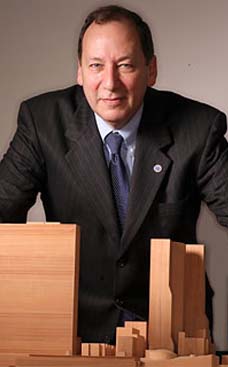
Their company, Planting Empowerment, leases land in the region ó a pocket of biological riches that has been eroding under decades of slash-and-burn farming. Money from investors is used to plant and tend about 500 trees an acre that, in 25 years, should become a source of valuable tropical hardwood. The key to the model is the concept of leasing, according to Damion Croston, a 29-year-old graduate student at Ohio University who is studying international development. (Another founder graduated in May from Thunderbird School for Global Management in Phoenix. The two others have degrees from Johns Hopkins and Virginia Tech.) When land is bought outright for tree plantations, the farmer is displaced. But Planting Empowerment is using only uncultivated, deforested parcels of a farmerís land, allowing agriculture to continue on other parcels. A lease clause prevents the use of the money to buy and clear more land. And to guarantee that the tree canopy is always increasing, trees are planted on different tracts at different times; as one patch of trees matures and is harvested, others will be in various stages of growth.
While working in eastern Panama between 2002 and 2006, four young Peace Corps volunteers conceived of a plan to help restore the regionís disappearing tropical forests, provide income for struggling landowners and make money for investors and themselves
A Tree Grows in Panama
By ANDREW C. REVKIN
Published: December 24, 2008
Caption: Officials of Planting Empowerment with a year-old teak sapling in Panama.
While working in eastern Panama between 2002 and 2006, four young Peace Corps volunteers conceived of a plan to help restore the regionís disappearing tropical forests, provide income for struggling landowners and make money for investors and themselves.
Itís one thing to have an idea and another to start a business, of course. But the partners ó using skills gleaned from academic programs in business, design and international relations ó have pulled it off.
Their company, Planting Empowerment, leases land in the region ó a pocket of biological riches that has been eroding under decades of slash-and-burn farming. Money from investors is used to plant and tend about 500 trees an acre that, in 25 years, should become a source of valuable tropical hardwood.
The key to the model is the concept of leasing, according to Damion Croston, a 29-year-old graduate student at Ohio University who is studying international development. (Another founder graduated in May from Thunderbird School for Global Management in Phoenix. The two others have degrees from Johns Hopkins and Virginia Tech.)
When land is bought outright for tree plantations, the farmer is displaced. But Planting Empowerment is using only uncultivated, deforested parcels of a farmerís land, allowing agriculture to continue on other parcels. A lease clause prevents the use of the money to buy and clear more land. And to guarantee that the tree canopy is always increasing, trees are planted on different tracts at different times; as one patch of trees matures and is harvested, others will be in various stages of growth.
Investors, who must plunk down a minimum of $7,000, have so far been mainly family and acquaintances, Mr. Croston says. But Planting Empowerment is now selling $50 and $100 forest savings bonds with an expected return, after lumber is harvested, equivalent to 7.8 percent a year. Some income from the plantings, now on 50 acres, is possible after five years, when foresters start thinning the dense stands of young trees to make room for others to grow to maturity.
The business plan has won recognition in college-sponsored competitions aimed at fostering socially responsible ventures, including those at the University of Washington, Notre Dame, Yale and the University of Texas, Austin, where Planting Empowerment was second out of more than 1,000 ideas.
To promote sustainable economic opportunity, Planting Empowerment intends not only to pay indigenous people for the use of their land but also to provide some higher-level employment and a share of profits.
ďWe believe,Ē Mr. Croston says, ďin a more inclusive sort of capitalism.Ē













